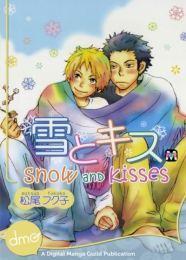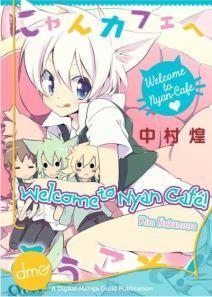
A few weeks ago I interviewed a letterer for my interview column. This time, I’ve interviewed an editor. The very first Thursday Lab Report interview I did do happened to be with an editor, and it’s been a while since I’ve gotten in touch with one…so considering how long it’s been, I’m here to provide with you an interview with the editor of Sinister Hands (a Digital Manga Group), Lindley Warmington.
Justin: So talk a little about yourself and just explain in general your job as an editor of manga?
Lindley Warmington: I’m a college student with focuses in publishing and Japanese history, language, and culture. I’ve been a freelance editor contracted with DMG for roughly two years now. As an editor, I review scripts, inspect lettered pages, and write the back cover copy for each volume. As a freelancer, a lot of my job also involves keeping in touch with DMG and fellow freelancers via emails. In all, it’s a really fun and rewarding job.

I didn’t exactly decide to be an editor. It just sort of happened. The opportunity presented itself, so I jumped on it and ended up getting the position. However, being a freelance editor actually has made me want to pursue a career as a full-time editor.
How did you become an editor for Sinister Hands, or just working with Digital Manga in general?
There’s a bit of a story as to how I became an editor. A while back, I read an article online about how DMP was planning to hire a bunch of freelancers for a big localizing project. The article made it sound like this was going to take off several years in the future, so I ended up putting it in the back of my mind. Just a few months later, a friend emailed me and told me that DMP had created an all-new branch called DMG and was hiring a bunch of people as freelancers. I signed up, took the test, and was among the first batch of applicants to be accepted. Our first task as localizers was to form groups. Because I was just starting out, I figured it would be easier to work with people who lived in the same timezone as myself. I quickly found Sarah, who is the other permanent member of Sinister Hands, and we’ve been working together since. The two of us came up with the name “Sinister Hands” together, actually.
How’s your general schedule when it comes to working on a manga? Is there a certain amount of titles you look over in a week, month, etc?
Every schedule is different. Some titles take a long time and some only take a few weeks. There are a lot of variables, such as how long the book is, how text-heavy the pages are, and how busy the members of the group are. So far, I’ve been able to complete six books a year. However, school has been getting more and more challenging, so unfortunately, I probably won’t be able to finish quite that many this next year.

Surprisingly, the biggest challenge for me has been quality control. Once the typesetter has finished lettering the pages and sent them back to me for review, I have trouble focusing on my job. The temptation to go with the flow and just passively read the story is very strong, and I actively have to fight it. I often have to take breaks in order to reset my mind back to editing mode. It ends up being a very slow process. However, it’s also my favorite part of editing because I get an idea of what the manga will look like once its finalized and submitted.
Are there any huge differences between editing for print as opposed to editing for digital?
I haven’t edited for print before. I’d imagine the processes are fairly similar. However, I’ve heard that people who work on print copies tend to use the original Japanese manga when doing tasks like editing scripts, searching for any untranslated text, or checking the work of the typesetter. Those of us in DMG, on the other hand, work with PDFs instead. I imagine that this might also mean that people who edit for print have to stare at computer screens slightly less.
Can you share a title you worked on that was difficult to tackle? Conversely, one that was easy to do?
I’ve worked on a few difficult titles so far. One that I worked on recently was set in feudal Japan and used very dated language and was full of obscure cultural references. Keeping the English text true to the original without making it too challenging or boring to read was very difficult. Another hard one to work on was very text heavy to the extent that an average panel probably had six bubbles/asides/sfx, and I don’t think there was a single panel that didn’t have at least one line of text. Work was very slow. I had to count the lines of text in every panel to be 100% certain everything was there. On the other hand, a manga that was easier for me to complete was one that just came out recently: Welcome to Nyan Cafe. It’s a bit shorter than a typical manga, and the pages didn’t have a ton of text. Also, all the cute dialog and jokes were really fun to work with.
What would your advice be for anyone who would want to become an editor?
I definitely recommend doing research into anything and everything Japanese. Editing manga is a lot easier when the cultural context they were written in is understood. And even when knowledge of Japan doesn’t help with editing, it brings a more intimate understanding of each book. Also, creative writing classes are surprisingly helpful. Knowing grammar and spelling is useful and all, but knowing the best way to phrase each line for maximum effect is a skill that will set you apart from the rest. Another thing to keep in mind about editing manga is that the job doesn’t mean just sitting around reading manga all day. It’s a very involved process that takes a lot more hard work and patience than I was expecting.
What titles is Sinister Hands currently working on, and should we expect to see them before the year is over?
Sinister Hands isn’t working on anything right now. The two of us are taking a bit of a break at the moment. However, in August, we finished Switch On! by Kashio, which was released on the emanga website only a few weeks ago. I also recently finished I Want to Hear Your Voice by Yukari Hashida, which I worked on with another group. It’s not out yet, but I’m hoping it will be by the end of the year.
Finally, can you share some manga that you would love to be published in the US?
Oh man… There are so many… Waltz by Isaka Kotaro is one that I’ve wanted to see in English ever since I bought the first volume in Japanese shortly after it came out. I’d also love to see more Go Nagai, Usamaru Furuya, and Junji Ito titles available. Two series that I’m dying to see continued in English are Descendants of Darkness by Yoko Matsushita and (though this second one is Korean) Rebirth by Kang-Woo Lee.


